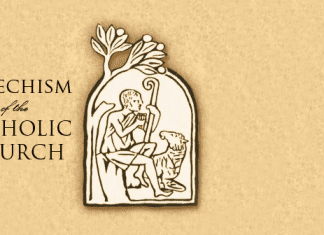Catechism of The Catholic Church #1731
1731 Freedom is the power, rooted in reason and will, to act or not to act, to do this or that, and so to perform deliberate actions on one's own responsibility. By free will one shapes one's own life. Human freedom is a force for growth and maturity in truth and goodness; it attains its perfection when directed toward God, our beatitude.
Catechism of The Catholic Church #1832
1832 The fruits of the Spirit are perfections that the Holy Spirit forms in us as the first fruits of eternal glory. the tradition of the Church lists twelve of them: "charity, joy, peace, patience, kindness, goodness, generosity, gentleness, faithfulness, modesty, self-control, chastity."
Catechism of The Catholic Church #1035
1035 The teaching of the Church affirms the existence of hell and its eternity. Immediately after death the souls of those who die in a state of mortal sin descend into hell, where they suffer the punishments of hell, "eternal fire." The chief punishment of hell is eternal separation from God, in whom alone man can possess the life and happiness for which he was created and for which he longs.
Catechism of The Catholic Church #1658
1658 We must also remember the great number of single persons who, because of the particular circumstances in which they have to live - often not of their choosing - are especially close to Jesus' heart and therefore deserve the special affection and active solicitude of the Church, especially of pastors. Many remain without a human family often due to conditions of poverty. Some live their situation in the spirit of the Beatitudes, serving God and neighbor in exemplary fashion. the doors of homes, the "domestic churches," and of the great family which is the Church must be open to all of them. "No one is without a family in this world: the Church is a home and family for everyone, especially those who 'labor and are heavy laden.'"
Catechism of The Catholic Church #892
892 Divine assistance is also given to the successors of the apostles, teaching in communion with the successor of Peter, and, in a particular way, to the bishop of Rome, pastor of the whole Church, when, without arriving at an infallible definition and without pronouncing in a "definitive manner," they propose in the exercise of the ordinary Magisterium a teaching that leads to better understanding of Revelation in matters of faith and morals. To this ordinary teaching the faithful "are to adhere to it with religious assent" which, though distinct from the assent of faith, is nonetheless an extension of it.
Catechism of The Catholic Church #1959
1959 The natural law, the Creator's very good work, provides the solid foundation on which man can build the structure of moral rules to guide his choices. It also provides the indispensable moral foundation for building the human community. Finally, it provides the necessary basis for the civil law with which it is connected, whether by a reflection that draws conclusions from its principles, or by additions of a positive and juridical nature.
Catechism of The Catholic Church #1774
1774 Emotions and feelings can be taken up in the virtues or perverted by the vices.
Catechism of The Catholic Church #1749
1749 Freedom makes man a moral subject. When he acts deliberately, man is, so to speak, the father of his acts. Human acts, that is, acts that are freely chosen in consequence of a judgment of conscience, can be morally evaluated. They are either good or evil.
Catechism of The Catholic Church #724
724 In Mary, the Holy Spirit manifests the Son of the Father, now become the Son of the Virgin. She is the burning bush of the definitive theophany. Filled with the Holy Spirit she makes the Word visible in the humility of his flesh. It is to the poor and the first representatives of the gentiles that she makes him known.
Catechism of The Catholic Church #680
680 Christ the Lord already reigns through the Church, but all the things of this world are not yet subjected to him. the triumph of Christ's kingdom will not come about without one last assault by the powers of evil.














